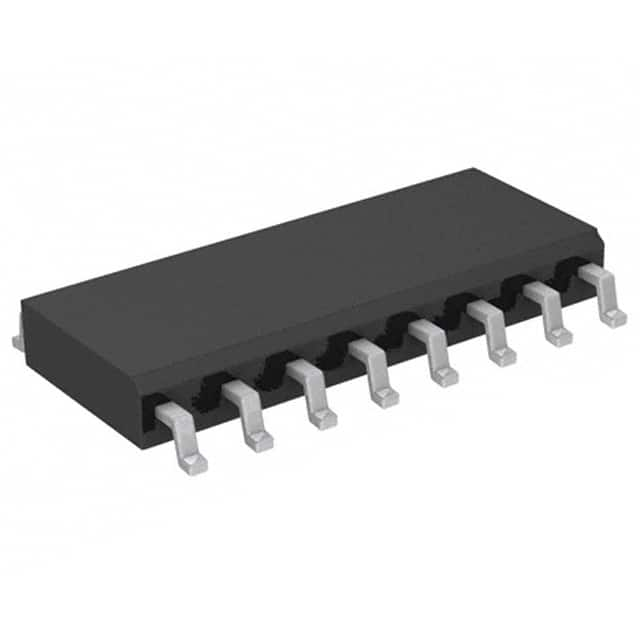Lihat spesifikasi untuk detail produk.

NB2308AI1DG
Basic Information Overview
- Category: Integrated Circuit (IC)
- Use: Signal Processing
- Characteristics: High-speed, Low-power
- Package: DIP-8 (Dual In-line Package)
- Essence: Voltage-controlled oscillator (VCO)
- Packaging/Quantity: Tape and Reel, 2500 units per reel
Specifications and Parameters
- Supply Voltage: 3.3V
- Frequency Range: 10MHz - 500MHz
- Output Power: 0dBm - 10dBm
- Operating Temperature: -40°C to +85°C
- Input Impedance: 50Ω
- Output Impedance: 50Ω
Detailed and Complete Pin Configuration
- VCC: Supply Voltage
- GND: Ground
- RF IN: Radio Frequency Input
- Vtune: Voltage Control Input
- RF OUT: Radio Frequency Output
- NC: No Connection
- NC: No Connection
- NC: No Connection
Functional Characteristics
The NB2308AI1DG is a voltage-controlled oscillator designed for signal processing applications. It offers high-speed operation and low power consumption, making it suitable for various wireless communication systems. The VCO's frequency can be controlled by applying a voltage to the Vtune pin, allowing precise frequency modulation.
Advantages and Disadvantages
Advantages: - High-speed operation - Low power consumption - Precise frequency control
Disadvantages: - Limited frequency range (10MHz - 500MHz) - Requires external voltage control
Applicable Range of Products
The NB2308AI1DG is commonly used in the following products: - Wireless communication systems - Radio transceivers - Frequency synthesizers - Test and measurement equipment
Working Principles
The NB2308AI1DG operates based on the principle of voltage-controlled oscillation. By applying a control voltage to the Vtune pin, the internal circuitry adjusts the frequency of the output signal accordingly. This allows for precise frequency modulation and synchronization with other components in a system.
Detailed Application Field Plans
The NB2308AI1DG can be applied in various fields, including: 1. Wireless Communication: Used in mobile phones, Wi-Fi routers, and Bluetooth devices for signal processing and frequency control. 2. Radio Transceivers: Enables frequency modulation and tuning in radio transceiver systems, such as walkie-talkies and amateur radios. 3. Frequency Synthesizers: Utilized in frequency synthesizer circuits to generate stable and adjustable frequencies for communication systems. 4. Test and Measurement Equipment: Integrated into test equipment like spectrum analyzers and signal generators for accurate frequency analysis and generation.
Detailed Alternative Models
- NB2309AI1DG: Similar to NB2308AI1DG but with extended frequency range up to 1GHz.
- NB2310AI1DG: Higher power output version of NB2308AI1DG, offering up to 20dBm output power.
- NB2307AI1DG: Lower power consumption variant of NB2308AI1DG, suitable for battery-powered applications.
5 Common Technical Questions and Answers
Q: What is the maximum frequency that can be achieved with NB2308AI1DG? A: The NB2308AI1DG has a maximum frequency range of 500MHz.
Q: Can I use NB2308AI1DG in a battery-powered device? A: Yes, NB2308AI1DG has low power consumption, making it suitable for battery-powered applications.
Q: How do I control the frequency of NB2308AI1DG? A: The frequency can be controlled by applying a voltage to the Vtune pin.
Q: Are there any alternative models with higher power output? A: Yes, you can consider NB2310AI1DG, which offers up to 20dBm output power.
Q: Can NB2308AI1DG be used in Wi-Fi routers? A: Yes, NB2308AI1DG is commonly used in Wi-Fi routers for signal processing and frequency control.
This encyclopedia entry provides an overview of the NB2308AI1DG integrated circuit, including its basic information, specifications, pin configuration, functional characteristics, advantages and disadvantages, applicable range of products, working principles, detailed application field plans, alternative models, and common technical questions and answers.

